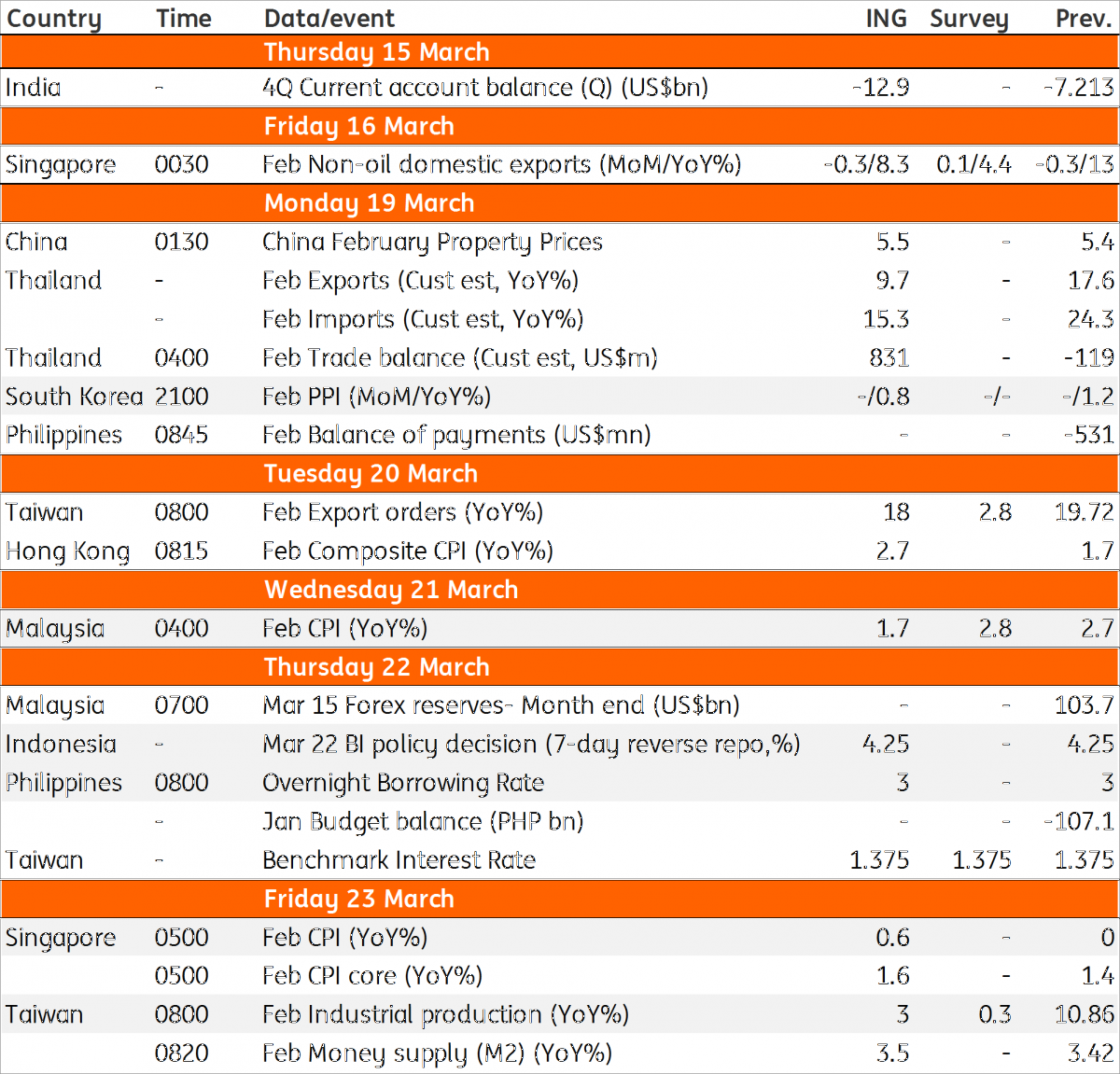Asia week ahead: three central banks to meet
Three Asian central banks are due to meet next week but all thinking and no action means they are most likely to be non-events - though the Philippines central bank could steal the spotlight
| 4.5% |
Philippines inflation in FebruarySurpassing the 2-4% medium-term target |
| Higher than expected | |
Philippines central bank defies tightening
The recent spike in Philippines’ consumer price inflation (CPI) above the central bank's 2-4% target has put monetary policy under the spotlight ahead of the March 22 policy meeting.
Inflation jumped to 4% year-on-year in January and further to 4.5% in February from 3.3% in 2017. The impact of tax reforms, rising food and utility prices are the main reasons which we expect to continue in the coming months.
However, Bangko Sentral ng Pilipinas's (BSP) policymakers have flagged their intention of not rushing into tightening to curb inflation. They argue that inflation would return to the target zone within the next 12 months and given the 12-18 months of policy lag, any tightening now would be ineffective anyway.
ING revises rate hike forecast
ING's economist for the Philippines, Joey Cuyegkeng expects inflation to peak within the next three to six month and expects no rate hike next week. He has also revised his forecast to no change from two 25bp rate hikes this year.
The stable monetary policy and widening trade and current account deficits will keep the Philippine Peso Asia’s underperforming currency this year.
Expect no change in Indonesia or Taiwan
The other two Asian central banks to meet next week are Bank Indonesia (BI) and Taiwan’s Central Bank of China (CBC), and there is a unanimous consensus that there will be no policy change by either. We expect both central banks to maintain the current policy settings throughout 2018.
Running little over 3% inflation has faded to be a policy concern in Indonesia. The expectations are that it remains well-anchored within BI’s 2.5-4.5% medium-term target. Growth is a bigger concern in Taiwan and weakening exports will put it above inflation as the policy goal this year. Taiwan data on export orders and industrial production will capture more attention next week.
A slew of inflation releases
February CPI inflation releases in Hong Kong, Malaysia and Singapore will be closely watched, and Malaysia and Singapore data will be of particular interest.
Our forecast of a further dip in Malaysian inflation below 2% means no pressure on the central bank to change policy anytime soon.
In Singapore, seasonally high food prices in the Lunar New Year month will pressure inflation up from zero percent in January, though these effects are transitory. We aren’t so confident about our forecast of the Monetary Authority of Singapore (MAS) moving to tightening in April.
Asia Economic Calendar

Download
Download article16 March 2018
Our view on next week’s key events This bundle contains {bundle_entries}{/bundle_entries} articles"THINK Outside" is a collection of specially commissioned content from third-party sources, such as economic think-tanks and academic institutions, that ING deems reliable and from non-research departments within ING. ING Bank N.V. ("ING") uses these sources to expand the range of opinions you can find on the THINK website. Some of these sources are not the property of or managed by ING, and therefore ING cannot always guarantee the correctness, completeness, actuality and quality of such sources, nor the availability at any given time of the data and information provided, and ING cannot accept any liability in this respect, insofar as this is permissible pursuant to the applicable laws and regulations.
This publication does not necessarily reflect the ING house view. This publication has been prepared solely for information purposes without regard to any particular user's investment objectives, financial situation, or means. The information in the publication is not an investment recommendation and it is not investment, legal or tax advice or an offer or solicitation to purchase or sell any financial instrument. Reasonable care has been taken to ensure that this publication is not untrue or misleading when published, but ING does not represent that it is accurate or complete. ING does not accept any liability for any direct, indirect or consequential loss arising from any use of this publication. Unless otherwise stated, any views, forecasts, or estimates are solely those of the author(s), as of the date of the publication and are subject to change without notice.
The distribution of this publication may be restricted by law or regulation in different jurisdictions and persons into whose possession this publication comes should inform themselves about, and observe, such restrictions.
Copyright and database rights protection exists in this report and it may not be reproduced, distributed or published by any person for any purpose without the prior express consent of ING. All rights are reserved.
ING Bank N.V. is authorised by the Dutch Central Bank and supervised by the European Central Bank (ECB), the Dutch Central Bank (DNB) and the Dutch Authority for the Financial Markets (AFM). ING Bank N.V. is incorporated in the Netherlands (Trade Register no. 33031431 Amsterdam).
